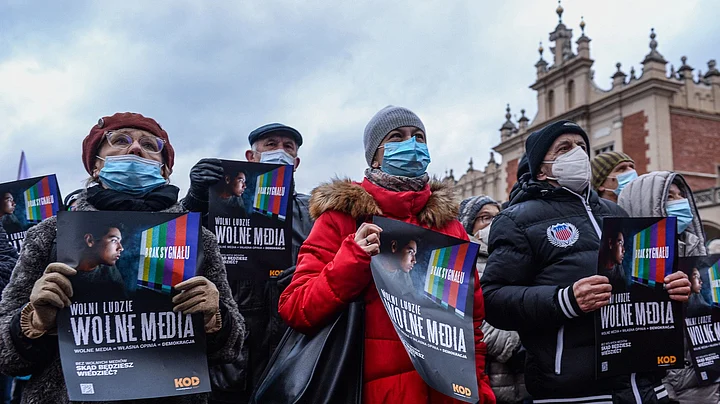Protests erupted all over Poland and even outside the presidential palace after the parliament hurriedly passed a bill last week that is (if signed into law) expected to limit media freedoms in the country.
A statement by the WAN-IFRA and the World Editors Forum (WEF) demanded that President Andrzej Duda veto the law, because "if adopted, the legislation will tighten rules of foreign ownership of media and would make it illegal for any non-European company to hold a majority stake in a television or radio broadcaster in Poland."
The WAN-IFRA is the World Association of Newspapers and News Publishers, an NGO consisting of news organisations and agencies in more than 100 countries (headquartered in Germany), with the objective of protecting press freedom all over the world.
The full statement can be found below.
The legislation will especially target one news channel - TVN24 - which is owned by the American media company Discovery Inc.
The statement by WAN-IFRA and the WED wrote about this well, claiming that "TVN is the last remaining independent broadcaster in the country. Ultimately, the law would undoubtedly prevent any enterprise from investing in Polish media."
Rafal Trzaskowski, the current mayor of Warsaw, insisted that while TVN is under threat, it is not only about that one channel.
"In a moment [there will be] censorship of the internet, an attempt to extinguish all independent sources of information – but we will not allow that to happen", The Guardian reported him saying.
TVN24 footage showed protesters chanting "free media" in Warsaw, while a protestor outside the presidential palace told AFP that Poland "needs free speech."
Both the US and the EU expressed their concern regarding the law.
"The United States is deeply troubled by the passage in Poland today of a law that would undermine freedom of expression, weaken media freedom and erode foreign investors confidence in their property rights and the sanctity of contracts in Poland," a state department spokesperson said on Friday.
Czech lawyer Vera Jourova, who is the vice-president of the European Commission for Values and Transparency, stated that "once this bill becomes a law, the commission will not hesitate to take action in case of non-compliance with EU law."
(With inputs from The Guardian and AFP)
(At The Quint, we question everything. Play an active role in shaping our journalism by becoming a member today.)
